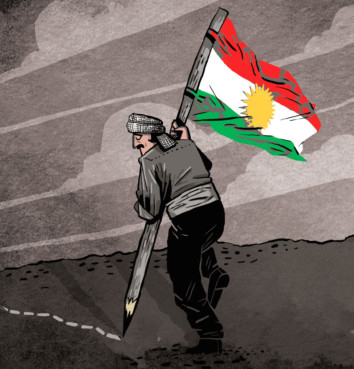
Every so often a proverb, that over the years had gained currency in a culture, will definitively encapsulate the essence of an occurrence in a people’s objective reality. One such is the Arab proverb: What is one man’s disaster may turn out to be another’s bonanza.
That’s what happened in Iraq after the US invasion in 2003. As Iraqi Arabs killed American troops, and then each other, while civilians fled the country en masse, Iraqi Kurds, in their autonomous enclave in the north — proclaimed since 1991 a no-fly zone over which Iraqi aircraft were forbidden from flying — lived a halcyon existence, mulling over whether it was the right moment to resurrect their dream for an independent Kurdistan.
That dream had frayed then wilted after the shah of Iran — in exchange for the 1975 Algiers Agreement that settled Iran’s dispute with Iraqi leader Saddam Hussain over the Shatt Al Arab waterway — abandoned his support for the Kurdish insurrection that year, which led to its collapse. (You will agree that the request by the Shah, as part of the agreement, to expel Ayatollah Khomeini, who then was living quietly in Iraq, must rank as one of the most maladroit decisions made by a political leader in the second half of the 20th century.)
But what is one to say about the Kurds’ ambitions to become an independent breakaway state, as demonstrated by the frenzy evinced at the referendum last Monday? At first blush, one’s instinct is to say that the solution to that quandary should be arrived at by Iraqis and Iraqis only — Iraqi Arabs and Iraqi Kurds. But the issue is much more complicated than that. It’s not only that the legality of the referendum has been questioned by the federal government in Baghdad, and feared — for the actual or potential threat to their national interests — by the three neighbouring countries, that themselves have sizeable Kurdish minorities with irredentist ambitions.
The referendum has been denounced, albeit in diplomatic language, by the United States, the United Nations and the European Union. Last Wednesday, in a statement on the eve of the vote, the State Department urged (read, “told” in no uncertain terms) Kurdish leaders to “accept the alternative, which is a serious and sustained dialogue with the central government [in Baghdad], facilitated by the United Nations and other parties”. And the White bluntly called the referendum “provocative and destabilising”.
All to no avail. Kurds rushed headlong to celebrate in their autonomous region in the north of Iraq, with fireworks streaking across the night sky, cars honking and crowds chanting. The most disconcerting images were those filed by photojournalists of Kurdish men burning their Iraqi passports and waving — hold on to your hat — Israeli flags. These folks probably never saw it as an indiscretion, one that was going to alienate them against supporters of Kurdish independence, including this columnist.
To be sure, not all Kurds are unanimous in their enthusiasm for or endorsement of this not-so-well thought-out secession from Iraq. Many, who lead a movement known by the resonant name “No for Now”, contend that it is the right idea, yes, but, given its pre-emptive nature, a good idea pursued at the wrong time.
Israel’s support
And the wrong time it is. For as things stand at this very moment and place of immediacy in the Kurdish region, The Kurdistan Regional Government (KRG), as the New York Times reported last Friday, quoting a member of the regional parliament, “is corrupt and dysfunctional, and has not yet built the democratic framework necessary for an independent nation”.
Moreover, the KRG is at least $20 billion (Dh73.4 billion) in debt, and reportedly public employees have been paid only about 40 per cent of their salaries since 2014.
And who needs another South Sudan in the heartland of the Middle East, whose emergence may — some experts say, will — destabilise and redraw the map of the entire region?
Israel does, that’s who. Benjamin Netanyahu, the Zionist prime minister, yet again at odds with the international community, is the only leader who, while vehemently opposing Palestinian statehood, has hypocritically given full-throated official support not only for the referendum but for an independent Kurdistan, where he sees ample opportunity — and seemingly warm welcome — for Israel’s expansion of its military choke-hold in the heartland of our part of the world.
The thought of cheering crowds waving Israeli flags, in a Kurdistan crawling with Israeli military advisers calling the shots (and not just figuratively), and with Israeli F16s based at an Arbil airbase, is enough to make those of us who, I say, support Kurdish independence flinch.
Fawaz Turki is a journalist, lecturer and author based in Washington. He is the author of The Disinherited: Journal of a Palestinian Exile.









